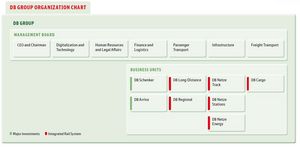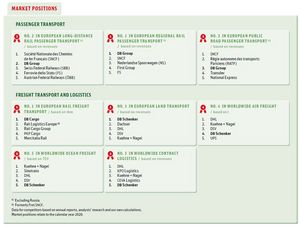Organizational structure
DB Group is a leading provider in the mobility and logistics sector, and primarily consists of the Integrated Rail System and the two major international subsidiaries DB Schenker and DB Arriva. The Integrated Rail System includes our passenger transport activities in Germany, our rail freight transport activities, the operating service units, and the rail infrastructure companies. DB Group, with its head office in Berlin, employs about 340,000 people. Our business operations are focused on rail transport in Germany.
Our primary concern is the shift from road traffic to climate-friendly rail. To this end, we rely on integrated operation of transport and rail infrastructure, the economically and environmentally intelligent linkage of all modes of transport, as well as cooperation in German and European networks. At about 33,000 km, our rail network in Germany is Europe’s longest. We are also one of the largest energy suppliers in Germany.
Our national and international services give us leading market positions in our relevant markets.
DB AG is the parent company of DB Group. It has been a stock corporation under German law since it was founded in 1994 and accordingly has a dual management and control structure comprising a Management Board and a Supervisory Board. The sole owner is the Federal Government of Germany. The changes in the composition of the Supervisory Board and the Management Board are presented in the Supervisory Board report.
In DB Group, DB AG runs all business units as an operating management holding company and supports the business units through various central group functions (including legal, corporate development, corporate accounting, taxes and insurance as well as finances, and treasury) as well as administrative service units. In addition, operational service units, as legally independent DB AG subsidiaries, primarily provide service for internal customers. These include DB Systel GmbH, DB Sicherheit GmbH, DB Services GmbH and DB Kommunikationstechnik GmbH.
DB Group train operating companies are legally independent companies with separate balance sheets and state-ments of income, and thus fulfill all unbundling requirements under European and national law. There is also a functional unbundling, which guarantees the independence of decisions by DB Netz AG in relation to infrastructure access and fees. The coalition agreement of the new Federal Government provides for a merger of DB Netz AG and DB Station&Service AG within DB Group. Reliability and stability form the basis of a high-quality infrastructure. The essential cornerstones for profitable business are sustainable financing of the existing infrastructure and its necessary expansion. The Performance and Financing Agreement (Leistungs- und Finanzierungsvereinbarung; LuFV) makes a significant contribution to ensuring the maintenance of the existing network.
With its Strong Rail strategy, DB Group focuses on the business operations of the Integrated Rail System.
Given the importance of Strong Rail for Europe, Europe will continue to be the main sphere of activity for DB Group in the future. Major international investments are measured by their contribution to the Strong Rail strategy:
- Strategically relevant subsidiaries such as DB Schenker will therefore continue to be held as financial investments. Joint operational initiatives focus on achieving synergies within the network.
- DB Arriva only accounts for a small amount of operational and strategic added value in Strong Rail. DB Arriva serves local markets in other European countries. Synergies with the Integrated Rail System on the customer, production or product side are currently non-existent or insignificant. The intention to sell remains unchanged.
Sustainability management
The great importance that sustainability, the environment and climate-related topics have at DB Group is reflected not only in our anchoring in the Strong Rail strategy, but also in our sustainability organization. The Chief Sustainability Officer (CSO) is responsible for the issues of sustainability and the environment – and therefore also for climate-related opportunities and risks. The role is exercised by the Chairman of the Management Board of DB AG. Overarching coordination is the responsibility of the Sustainability and Environment organizational unit with its five specialist departments in the division of the Chairman of the Management Board. The Sustainability and Environment unit designs DB Group’s Green Transformation and ensures its implementation. In particular, it is responsible for defining the integrated sustainability and environmental strategy, the associated Group-wide targets and key figures, and for planning, managing and implementing Group-wide transformation projects. The respective specialist departments in the unit are responsible for the content of specific sustainability issues. The development of further environment monitoring tools, our involvement in sustainability networks and our participation in national and international committees ensure that trends and drivers, as well as opportunities and risks in the field of sustainability and the environment, including climate protection and climate resilience management, are monitored and are strategically and professionally addressed for DB Group. This ensures Group-wide access to expertise on sustainability and environmental and climate issues.
Sustainability and the environment are a top priority of the Strong Rail strategy. The Supervisory Board and the Group Management Board receive quarterly updates on the status of the Environment and 100% green electricity building block for the Green Transformation and thus about sustainability, environmental and climate issues. Progress in greenhouse gas reduction and noise reduction is reviewed at regular performance review meetings held during the year, which are attended by the Group Management Board and the executives of the business units. The achievement of greenhouse gas emissions targets is included in the calculation of the variable compensation for members of the Management Board and other executives as well as certain employee group.
The management of Sustainability and Environment at DB Group is the highest position responsible for sustainability and climate-related issues under DB Group’s Management Board and reports directly to the Chairman of the Management Board. The unit advises and supports the Management Board of DB Group in the strategic management and implementation of the Green Transformation. Regular meetings ensure close communication about sustainability, environmental and climate issues at Management Board level. Specific tasks include the preparation of recommendations for action for DB Group, its business units and service units. In addition, among other things, the division is responsible for planning and monitoring the achievements of the respective targets, for example in relation to our climate protection and noise reduction targets. The business units are responsible for implementing the targets, strategies and measures.
Business model
DB Group offers attractive, customer-focused and environmentally friendly mobility, transport and logistics solutions and networks from a single source. We utilize the possibilities of digital technologies to improve our operational and administrative processes, to continuously develop services for customers, to integrate new services, and to simplify the customer interface. The Integrated Rail System is at the heart of our business activities. In addition, we are gradually expanding our business portfolio in the area of mobility and logistics in order to meet our customers’ needs more effectively and respond to new market demands.
- Our passenger transport activities have a broad base. In addition to bus and rail transport, this also includes intelligent links with other modes of transport such as cars and bicycles, but also with new forms of mobility that complement the core business and enable door-to-door mobility. We offer long-distance rail passenger transport within Germany and into neighboring countries. DB Arriva has a Europe-wide presence in regional and local transport, enabling participation in the increasing market potential in opening bus and rail transport markets.
- Our business activities in the freight transport and logistics market were moved to an international platform very early on. DB Cargo and DB Schenker operate predominantly in the business-to-business segment. We offer our customers industry-specific solutions in European rail freight transport and global land transport, in global air and ocean freight, and in global contract logistics. Covering all relevant modes of transport allows us to offer complex combined logistics services and to make use of synergies in our networks for the benefit of our customers.

